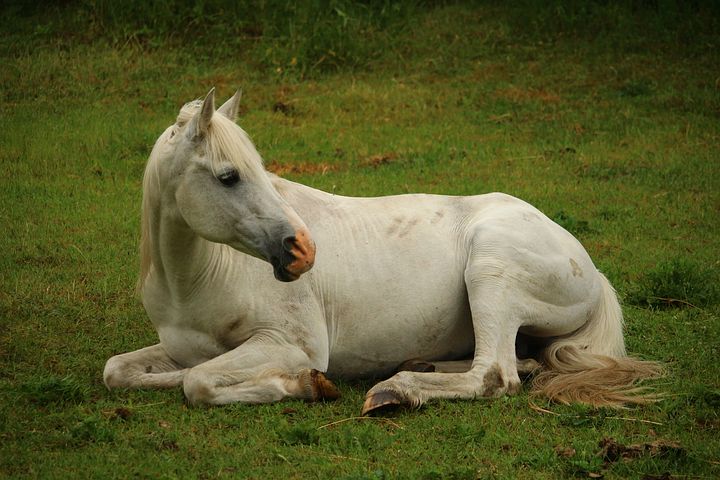The big day has finally arrived. You’re at a show, brimming with expectancy and excitement. You have practised the routine over and over, now its show time. You glance over at your horse. Is he nervous or excited? No. He’s standing right next to you with his head hanging low and his eyes closed, fast asleep. How could he be sleeping at a time as important as this?
As humans, we generally need a comfortable bed, a dark room, and eight hours of peace and quiet. That’s how we get a good night’s sleep. But sometimes it is easy to forget that our horse’s needs are different to ours. Here at Prime Stables we know the importance of sleep for your horse so we thought we would inform you of how horses sleep and the ways you could help improve their quality of sleep so that they are at their best.
Why Do Horses Sleep Standing Up?
Your horse will sleep standing up most the time, his legs locking in place via a system of tendons and ligaments that stop him from falling over. By locking his legs into position, he can relax his muscles and doze off without keeling over. Because horses are prey to other animals, at least in the wild, they often don’t like sleeping on the ground. Due to their beautiful straight backs, horses cannot stand up quickly. Therefore, if a horse were to be approached by a predator while it was lying down, it may not be able to stand up fast enough to make his escape.
Do Horses Ever Sleep Lying Down?
Just because your horse can sleep standing up and prefers it that way, doesn’t mean that it never lies down. Horses tend to nap throughout the day and in this time they tend to lie down, giving them a chance to rest their legs. On sunny days, it is common to see entire herds of horses lying in the grass, soaking up those sunny rays. However, whenever you see a group of horses lying down it is common to see one horse standing up, guarding the others from possible intruders.
Although we tend to think that horses sleep lying down, that doesn’t seem to stop our surprise at seeing them stretched out in grassy fields. In fact, some police stations report that on particularly sunny days – when horses are most inclined to lay about – they will receive numerous panicked calls from concerned onlookers assuming the horses are unwell or dead. Of course, they are just horses snoozing in the luxurious weather just as we would do if we were at the beach!
Changing Sleep Patterns
Horses sleep patterns will change depending on their age. Foals will lie down for very frequent naps and spend about half of their day sleeping until they are grown to three months old. As foals get older, the frequency of their naps reduces and they start to sleep standing up.
Weather Can Impact Sleep
The weather has a surprisingly large impact on how a horse sleeps. During very cold or wet weather, your horse will find it difficult to get comfortable enough to sleep. Therefore, it is best to bring your horse in so that it is sheltered, comfortable and able to get a proper sleep. Whether your horse is kept out in pasture or is stabled, it needs a comfortable and secure place to rest.
Have You Got a Sleeping Buddy?
Horses are very sociable creatures and generally prefer being in groups rather than isolation. Horses also like using the buddy system for sleeping. The buddy system ensures that the horses going to sleep are safe from potential predators. While one horse sleeps, the other will be on the lookout. If in a herd, the role of the watch-horse will rotate as each member of the herd gets the sleep that they need – like penguins keeping warm in their buddy circles that rotate so that everyone gets a turn in the warm centre. It is common for horses to adopt this sleeping buddy system whether they are in their home barn setting, a paddock, a stall next to their regular neighbours, or in a completely unfamiliar environment.
Has this article been informative on the sleeping habits of horses? Are there any facts that surprised you? We would love to hear from you!


